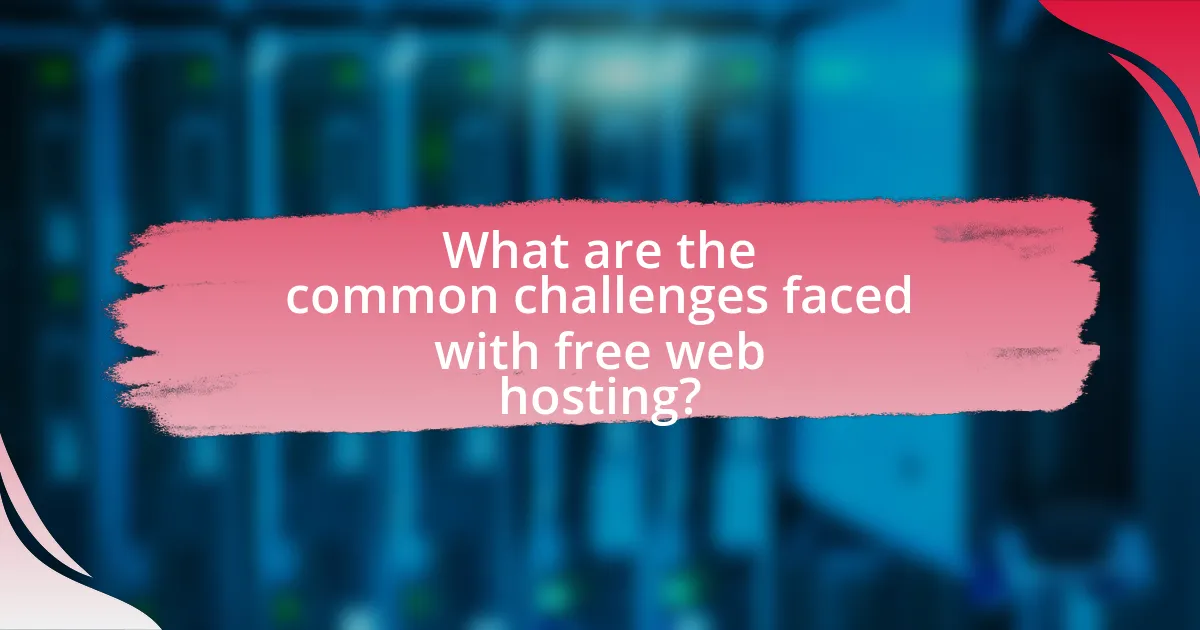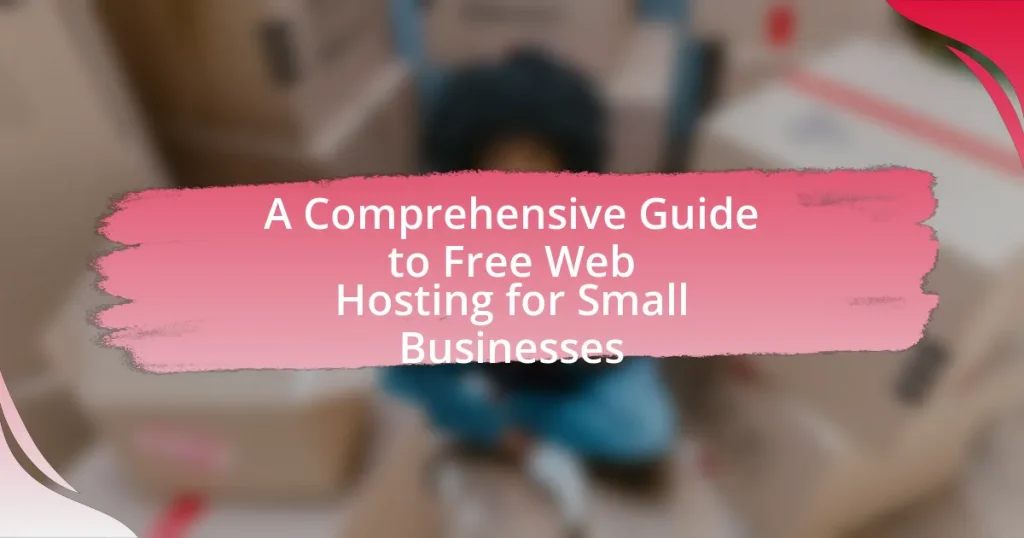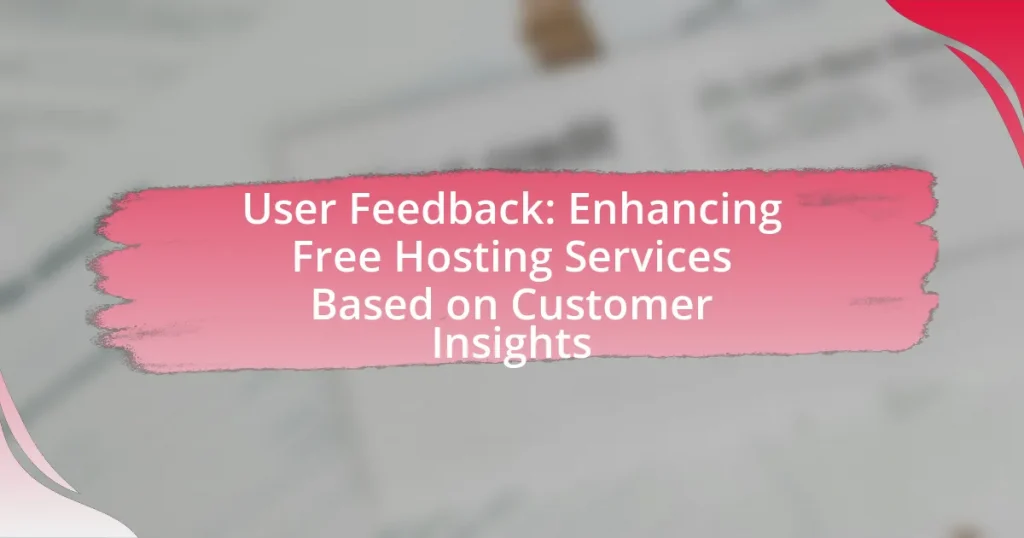Free web hosting for small businesses is a cost-effective solution that allows companies to establish an online presence without financial investment, though it often comes with limitations such as restricted resources, advertisements, and minimal customer support. This guide explores the differences between free and paid hosting options, the limitations and potential cost savings of free services, and the types of free hosting available, including shared hosting and website builders. It also addresses the importance of customer support, security measures, and strategies for optimizing website performance, while highlighting the common challenges and risks associated with free hosting. Finally, the article provides insights on transitioning to paid hosting and best practices for maintaining professionalism and maximizing the benefits of free web hosting.

What is Free Web Hosting for Small Businesses?
Free web hosting for small businesses is a service that allows companies to host their websites without incurring any costs. This type of hosting typically offers limited resources, such as storage space and bandwidth, and may include advertisements on the hosted site. Many providers, such as InfinityFree and 000webhost, offer free plans that can be suitable for startups or small enterprises looking to establish an online presence without financial investment. However, these services often come with restrictions, such as lower performance and limited customer support, which can impact the user experience and scalability as the business grows.
How does free web hosting differ from paid options?
Free web hosting differs from paid options primarily in terms of features, reliability, and support. Free web hosting typically offers limited storage, bandwidth, and functionality, often accompanied by advertisements on the hosted site, while paid hosting provides more resources, enhanced performance, and customer support. For instance, a study by HostingAdvice in 2021 indicated that 70% of free hosting services impose restrictions that can hinder website growth, whereas paid services often include scalability options and dedicated customer service, ensuring better uptime and security.
What are the limitations of free web hosting services?
Free web hosting services have several limitations, including restricted storage space, limited bandwidth, lack of customer support, and the presence of advertisements. These services often provide minimal storage, typically ranging from 1GB to 5GB, which can hinder the ability to host larger websites or applications. Bandwidth limitations can restrict the number of visitors a site can handle, potentially leading to downtime during peak traffic. Additionally, free hosting often lacks reliable customer support, leaving users without assistance when issues arise. Furthermore, many free hosting providers display advertisements on users’ sites, which can detract from the professional appearance of a business. These factors collectively make free web hosting less suitable for small businesses aiming for growth and professionalism.
How do free web hosting services generate revenue?
Free web hosting services generate revenue primarily through advertising, upselling premium services, and data monetization. These services often display ads on users’ websites, earning income from advertisers based on impressions or clicks. Additionally, many free hosting providers offer enhanced features, such as increased storage or custom domains, for a fee, encouraging users to upgrade. Furthermore, some companies may collect and sell user data to third parties, contributing to their revenue streams. This model allows them to provide free services while maintaining profitability.
Why should small businesses consider free web hosting?
Small businesses should consider free web hosting primarily to reduce initial costs while establishing an online presence. This option allows them to allocate limited financial resources to other critical areas such as marketing or product development. According to a survey by Clutch, 30% of small businesses reported that budget constraints significantly impact their ability to create a website. Free web hosting provides essential features like basic website building tools and limited storage, enabling small businesses to launch their sites without upfront investment.
What are the potential cost savings for small businesses?
Small businesses can achieve significant cost savings by utilizing free web hosting services, which eliminate monthly hosting fees that typically range from $5 to $100. By opting for free hosting, small businesses can allocate their financial resources towards other critical areas such as marketing, product development, or customer service. Additionally, many free web hosting platforms offer essential features like website builders and templates, reducing the need for hiring web developers, which can save thousands of dollars. According to a report by the Small Business Administration, small businesses that effectively manage their operational costs can increase their profitability by up to 30%.
How can free web hosting support startups and entrepreneurs?
Free web hosting can support startups and entrepreneurs by providing them with a cost-effective platform to establish their online presence. This allows new businesses to allocate their limited resources towards other critical areas such as product development and marketing. According to a survey by Clutch, 30% of small businesses reported that cost is a significant barrier to launching their websites. By utilizing free web hosting services, startups can overcome this barrier, enabling them to test their business ideas and reach potential customers without incurring initial expenses. Additionally, many free hosting providers offer essential features like website builders and templates, which simplify the process of creating a professional-looking site, further supporting entrepreneurs in their early stages.
What types of free web hosting services are available?
There are several types of free web hosting services available, including shared hosting, website builders, and cloud hosting. Shared hosting allows multiple users to host their websites on a single server, making it cost-effective but often limited in resources. Website builders, such as Wix or Weebly, provide user-friendly interfaces for creating websites without technical knowledge, often with free plans that include hosting. Cloud hosting offers scalable resources and is typically more flexible, allowing users to pay for what they use, although free tiers may have limitations. Each type serves different needs, making it essential for users to choose based on their specific requirements.
What are the differences between shared, cloud, and website builders?
Shared hosting involves multiple websites sharing the same server resources, making it cost-effective but potentially slower due to resource competition. Cloud hosting utilizes a network of virtual servers, allowing for scalable resources and improved performance, as it can handle traffic spikes more efficiently. Website builders are platforms that enable users to create websites without coding, offering templates and drag-and-drop features, which simplifies the design process but may limit customization compared to traditional hosting options. Each option serves different needs: shared hosting is budget-friendly, cloud hosting offers flexibility and reliability, and website builders prioritize ease of use.
Which platforms offer the best free web hosting options?
The platforms that offer the best free web hosting options include WordPress.com, Wix, and InfinityFree. WordPress.com provides a user-friendly interface and a variety of themes, making it suitable for blogs and small websites. Wix offers drag-and-drop functionality and customizable templates, ideal for users without technical skills. InfinityFree stands out for its unlimited disk space and bandwidth, catering to users who need more resources. These platforms are widely recognized for their reliability and features, making them popular choices for small businesses seeking free web hosting solutions.

What are the key features to look for in free web hosting?
Key features to look for in free web hosting include storage space, bandwidth, uptime reliability, customer support, and domain options. Storage space determines how much data you can store, while bandwidth affects the amount of traffic your site can handle. Uptime reliability is crucial, as it indicates how often your site will be accessible; a minimum of 99.9% uptime is standard. Customer support is important for resolving issues quickly, and options for a custom domain enhance your site’s professionalism. These features collectively ensure that the free web hosting service meets the basic needs of small businesses effectively.
How important is customer support in free web hosting?
Customer support is crucial in free web hosting as it directly impacts user experience and problem resolution. Many free hosting services lack robust support, which can lead to prolonged downtime and frustration for users. According to a survey by the HostingAdvice team, 70% of users reported that responsive customer support is a key factor in their satisfaction with hosting services. This highlights that effective customer support can significantly enhance the usability and reliability of free web hosting options for small businesses.
What types of support can users expect from free hosting providers?
Users can expect limited support from free hosting providers, typically including basic documentation, community forums, and minimal customer service. Free hosting services often do not offer 24/7 technical support or personalized assistance, which is common in paid hosting plans. For instance, many free hosting platforms provide FAQs and user guides to help users troubleshoot common issues, but direct support channels like live chat or phone support are usually absent. This limited support structure is a trade-off for the cost-free service, as providers aim to reduce operational costs while catering to a large user base.
How does the quality of support impact user experience?
The quality of support significantly impacts user experience by directly influencing user satisfaction and retention. High-quality support leads to quicker issue resolution, which enhances user confidence and trust in the service. For instance, a study by Zendesk found that 82% of consumers have stopped doing business with a company due to poor customer service. This statistic underscores the importance of effective support in maintaining a positive user experience, particularly in the context of free web hosting for small businesses, where users often rely on support to navigate technical challenges.
What security measures should be considered?
Security measures that should be considered for free web hosting include implementing SSL certificates, using strong passwords, enabling two-factor authentication, regularly updating software, and employing firewalls. SSL certificates encrypt data transmitted between users and the website, enhancing security against eavesdropping. Strong passwords reduce the risk of unauthorized access, while two-factor authentication adds an extra layer of protection. Regular software updates patch vulnerabilities, and firewalls help block malicious traffic. According to a 2021 report by Cybersecurity Ventures, cybercrime is projected to cost the world $10.5 trillion annually by 2025, underscoring the importance of these security measures.
How do free web hosting services protect user data?
Free web hosting services protect user data primarily through encryption, secure server configurations, and privacy policies. Encryption protocols, such as SSL (Secure Socket Layer), safeguard data transmitted between users and the hosting servers, making it difficult for unauthorized parties to intercept sensitive information. Additionally, secure server configurations limit access to user data by implementing firewalls and access controls, which help prevent data breaches. Privacy policies outline how user data is collected, stored, and used, ensuring transparency and compliance with data protection regulations. These measures collectively enhance the security of user data on free web hosting platforms.
What are common security risks associated with free web hosting?
Common security risks associated with free web hosting include limited security features, lack of customer support, and potential for malware infections. Free web hosting services often do not provide robust security measures such as SSL certificates, firewalls, or regular backups, making websites vulnerable to attacks. Additionally, the absence of dedicated customer support can hinder timely responses to security breaches. Research indicates that free hosting platforms are frequently targeted by hackers due to their lower security standards, increasing the likelihood of data breaches and malware distribution.
How can small businesses optimize their use of free web hosting?
Small businesses can optimize their use of free web hosting by selecting a provider that offers essential features such as adequate bandwidth, storage, and customer support. By carefully choosing a platform that aligns with their specific needs, businesses can ensure reliable performance and minimize downtime. Additionally, they should utilize available tools for search engine optimization (SEO) and analytics to enhance visibility and track website performance. According to a study by HubSpot, companies that actively engage in SEO see an average of 14.6% conversion rate, significantly higher than the 1.7% conversion rate for outbound leads. Furthermore, small businesses should regularly update their content and utilize social media integration to drive traffic and engagement. This strategic approach allows them to maximize the benefits of free web hosting while maintaining a professional online presence.
What strategies can enhance website performance on free hosting?
To enhance website performance on free hosting, optimizing images and utilizing caching techniques are essential strategies. Optimizing images reduces file sizes without sacrificing quality, which decreases loading times; for instance, using formats like WebP can lead to a 25-34% reduction in image size compared to JPEG. Implementing caching techniques, such as browser caching and server-side caching, can significantly improve load times by storing frequently accessed data, thus reducing the need for repeated data retrieval from the server. These strategies are crucial because free hosting often has limited resources, making performance optimization vital for user experience and search engine ranking.
How can businesses effectively manage their online presence with limited resources?
Businesses can effectively manage their online presence with limited resources by prioritizing essential digital marketing strategies and utilizing free or low-cost tools. Focusing on social media platforms allows businesses to engage with their audience without significant financial investment, as platforms like Facebook, Instagram, and Twitter offer free account creation and organic reach. Additionally, leveraging free website builders, such as WordPress or Wix, enables businesses to establish a professional online presence without incurring hosting fees.
Research indicates that 70% of small businesses use social media to promote their products and services, highlighting its effectiveness in reaching potential customers. Furthermore, utilizing free analytics tools like Google Analytics helps businesses track website performance and user engagement, allowing for data-driven decisions that optimize online strategies. By concentrating on these cost-effective methods, businesses can maintain a robust online presence while managing limited resources efficiently.

What are the common challenges faced with free web hosting?
Common challenges faced with free web hosting include limited storage and bandwidth, lack of customer support, and the presence of advertisements on hosted sites. Limited storage and bandwidth can hinder website performance and scalability, making it difficult for small businesses to grow. The absence of reliable customer support can lead to prolonged downtime and unresolved technical issues, negatively impacting user experience. Additionally, advertisements imposed by free hosting services can detract from the professional appearance of a business website, potentially driving away customers. These challenges highlight the trade-offs associated with opting for free web hosting solutions.
What are the risks of using free web hosting for business?
Using free web hosting for business poses several risks, including limited resources, lack of customer support, and potential security vulnerabilities. Limited resources can lead to slow website performance and downtime, which negatively impacts user experience and can result in lost revenue. The absence of customer support means that businesses may struggle to resolve technical issues promptly, further affecting their online presence. Additionally, free web hosting services often lack robust security measures, making websites more susceptible to hacking and data breaches, which can compromise sensitive customer information and damage a business’s reputation.
How can downtime affect a small business’s reputation?
Downtime can significantly harm a small business’s reputation by eroding customer trust and satisfaction. When a business experiences downtime, customers may perceive it as a lack of reliability and professionalism, leading to negative reviews and diminished customer loyalty. According to a study by the Ponemon Institute, 60% of consumers reported that they would stop doing business with a company after experiencing a service outage. This statistic underscores the critical impact of downtime on customer perceptions and the potential long-term damage to a small business’s reputation.
What are the implications of limited bandwidth and storage?
Limited bandwidth and storage can severely restrict a small business’s online presence and operational efficiency. When bandwidth is limited, the speed at which data is transmitted is reduced, leading to slower website loading times, which can deter potential customers; studies show that a one-second delay in page load time can result in a 7% reduction in conversions. Additionally, limited storage capacity can hinder the ability to host essential files, applications, and customer data, potentially leading to data loss or the inability to scale services as the business grows. These constraints can ultimately affect user experience, customer satisfaction, and the overall growth potential of the business.
How can small businesses transition from free to paid hosting?
Small businesses can transition from free to paid hosting by selecting a suitable paid hosting provider, backing up their website data, and migrating their content to the new platform. First, businesses should research and choose a hosting provider that meets their needs in terms of performance, support, and scalability. Popular options include Bluehost, SiteGround, and HostGator, which offer various plans tailored for small businesses.
Next, it is essential to back up all website data, including files, databases, and emails, to prevent data loss during the transition. Many hosting providers offer tools for easy backups. Finally, businesses should follow the migration process outlined by their new hosting provider, which typically involves uploading files, importing databases, and updating domain settings. This structured approach ensures a smooth transition while minimizing downtime and maintaining website functionality.
What signs indicate it’s time to upgrade from free hosting?
Signs that indicate it’s time to upgrade from free hosting include frequent downtime, limited bandwidth, and lack of customer support. Frequent downtime disrupts website accessibility, which can lead to lost traffic and revenue. Limited bandwidth restricts the number of visitors your site can handle, potentially causing slow loading times or crashes during peak traffic. Additionally, inadequate customer support can hinder your ability to resolve issues promptly, affecting your business operations. These factors collectively suggest that a transition to a paid hosting service is necessary for improved performance and reliability.
How can businesses prepare for a smooth transition to paid hosting?
Businesses can prepare for a smooth transition to paid hosting by conducting a thorough assessment of their current hosting needs and selecting a suitable paid hosting plan that aligns with their growth objectives. This involves evaluating website traffic, storage requirements, and specific features such as security and customer support. Research indicates that 70% of businesses experience improved performance and reliability after switching to paid hosting, highlighting the importance of choosing a plan that meets their operational demands. Additionally, businesses should back up their existing data and ensure compatibility with the new hosting environment to minimize downtime during the transition.
What are the best practices for using free web hosting?
The best practices for using free web hosting include selecting a reliable provider, understanding limitations, optimizing for performance, and ensuring data security. Choosing a reputable free web hosting service, such as InfinityFree or 000webhost, can provide better uptime and support. Users should be aware of limitations like bandwidth caps and storage restrictions, which can affect website performance. To enhance performance, optimizing images and minimizing scripts is essential. Additionally, implementing basic security measures, such as using strong passwords and enabling SSL, helps protect user data. These practices ensure a more effective and secure experience while using free web hosting services.
How can small businesses maintain professionalism with free hosting?
Small businesses can maintain professionalism with free hosting by selecting providers that offer custom domain names and ad-free experiences. Using a custom domain enhances brand identity and credibility, while avoiding ads prevents distractions and maintains a clean appearance. For instance, platforms like WordPress.com and Wix allow users to connect their own domains even on free plans, which supports a professional image. Additionally, ensuring that the website design is user-friendly and mobile-responsive contributes to a positive user experience, further reinforcing professionalism.
What tips can help maximize the benefits of free web hosting?
To maximize the benefits of free web hosting, small businesses should focus on optimizing their website’s performance and user experience. This includes selecting a reliable free hosting provider with minimal downtime, ensuring fast loading speeds, and utilizing content management systems that are compatible with the hosting service. Additionally, businesses should regularly update their content to improve SEO and engage visitors, while also leveraging social media to drive traffic to their site. Research indicates that websites with optimized performance can see up to a 50% increase in user engagement, highlighting the importance of these strategies.















